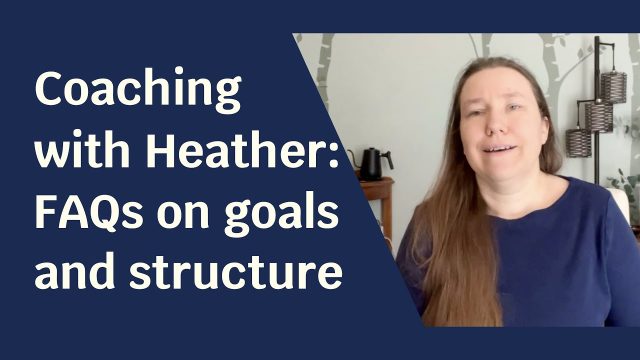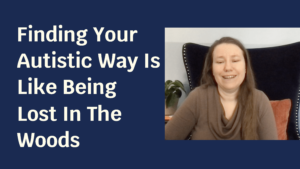
How do sessions link together? How much structure is there?
So, here’s a bit about how sessions link together.
My mentor, Martha Beck, holds the philosophy of being in “constant creative response to the present moment“. And I really love that. It’s so very much not how I lived most of my life before I realized I’m Autistic, but I’ve gotten to a point where that resonates with me.
And so I don’t I don’t have a specific curriculum that I take everyone through. I don’t come up with goals at the beginning, and then we work towards meeting those goals. It doesn’t work. Because the goals that you would set initially are coming from a place of your internalized ableism, and your internalized capitalism, and your internalized painful thoughts, and your trauma history.
But as you heal from those things, and as they become less of an influence in your life, those goals need to become less relevant in your life. Because the goals are going to change based upon a new understanding of yourself that’s in constant development.
It’s not like flipping a switch, like oh, I’ve figured out everything and now this is going to be a new static me. You’re constantly going to be unpacking layers and layers of the onion, figuring out new ways to be you.
You’re constantly going to be unpacking layers and layers of the onion, figuring out new ways to be you.
And so having a set of goals, or pre-defined curriculum, or any set thing to be accountable to from the outset, is going to be an exercise in frustration because you’re going to be constantly failing at doing that. But failing at that is actually succeeding at becoming more authentically you and building a better life for yourself.
And I think the goal becomes a distraction from realizing the beauty of that failure. Because goals, at least in areas of personal growth development, can be a way of over focusing on a single thing.
I mean, sometimes a broad enough goal can be valuable. Or goals that are more value based, like, figuring out what you want, how you feel more creative, more connected, more meaningful, that sort of thing.
Some people want to have more of a link between meetings, like I’m working on this type of thing, like my relationship with my partner, or making my job better, for example, and there’ll be a new aspect to it each session.
And some people prefer that every time could be completely different. And I like to give you the freedom to be able to choose that.
So I generally start sessions with a question like, “Where would you like to start today?” Or “what’s on your mind that you like to talk about today?” And if you’d like to keep them linked, you can bring up something that’s related to what we usually talk about. If you’d like it to be something completely different, you can bring up something new. Whatever you bring up, I’ll go along with it.
Do you give homework?
Do I give homework? No. Except in rare cases, when someone really insists.
Because I’ve found that often what happens, if I assign homework, is that my clients are more likely to spend the entire time between sessions focusing on the homework, and resisting doing it, and obsessing about not having done it, and beating themselves up about not having done it, and anxious about what I’ll say or think, and hating that they care about that, and not actually reflecting on the stuff that we’ve talked about.
But if I don’t assign homework, they’re more likely to reflect on it naturally, and may even do more to actually live into it than I would have ever dreamed of assigning.
Will you be an accountability partner for me?
So, I am not an accountability coach.
A lot of coaching, and coaches, are very goal oriented, like “be able to strike up conversations with three people,” or “always take your pills at the same time,” and the coach provides accountability to get you to do it. I don’t do that. I don’t like that. That’s not my style. And I think it’s buying into the kind of coercive systems of our society that I want to break away from.
Of course you have practical things that you’d like to work towards, and I can help support you do to do that, but I’m not going to create artificial, external goals for you, and I’m not going to get on your case about why you didn’t follow through on something you said you would, or why you chose to do something else.
In fact, I rarely even ask follow-up questions on where we left off before, even when I’m curious, because I don’t want it to seem like I’m checking up on you. And when you freely update me on what you’ve done between sessions, I’m not going to get on your case about what happened. That’s not me.
And, at the same time, I recognize that we all have practical things that we’re trying to get better at. It might be taking your pills regularly, or dealing with distractibility, or other executive functioning stuff.
But how I approach it is by looking deeply at what’s going on. Why is this not working for you? Is the goal itself inappropriate? Sometimes it’s hard to tell, because we’re so used to thinking about it in a particular way, because our society assumes that’s the only way to do it. Well, we could gently question that story and loosen the grip of the expectation of doing it the same as others.
If you know you need to do it a different way, maybe you’re not really sure what other options there are? We can explore those.
Or maybe there’s something holding you back because of a belief that you that you “should be better than this”, or “it’s not okay to make mistakes”, or “waiting is intolerable”, or “you’re not allowed to be weird”, or “you need to try harder”, or “nothing works for you anyway”, so “what’s the point in trying?”, or “you’re bad at people so you’re bound to mess it up”. We pick up so many of those kinds of beliefs throughout life, that influence how we are in the world, and how we interact with other people, and how we think about ourselves, and what we manage to accomplish, and they’re usually not true. Not entirely. And because some part of you knows they really aren’t true for you, that conflict drains a lot of energy. It takes a lot of energy to believe things that you know really aren’t true.
It takes a lot of energy to believe things that you know really aren’t true.
So that’s my specialty; deconstructing those beliefs.
And then we very naturally go back to the original, practical question, and if it’s something you still want, are there other barriers for why you’re not doing it? Or maybe that’s not actually what they want.
So instead of setting artificial goals and suggesting tricks and techniques and accountability to meet those goal—that’s just more conformity training—I help people figure out what they really want and what’s getting in the way of that happening, whether it’s thoughts or beliefs, or very practical circumstances, or not knowing how to do the thing.
And especially because I work with Autistics and AuDHDers and other neurodivergents, we often work together on how to tweak the things we do so that the methods work for your particular brain and nervous system, so that you actually can do the thing.
Once those barriers are out of the way, if it’s something that you still want to do, you’re likely to naturally start doing it, you won’t need to have someone hold you accountable for it. I repeatedly find that when there’s something that you want to do, and you can do it, you don’t need an external, artificially imposed accountability partner getting on your case about it.
By the way, I’m not saying that goals are never useful. It’s not all or nothing. I’m specifically talking about areas of personal development.
But my style is more of working with the thoughts and beliefs that we’ve collected over a lifetime that no longer serve us. One more example, when you tried things that didn’t work, but that was billed as the only way, or the right way, was it was presented as your fault for it not working? Did you end up with shame on top of the original problem? That’s the kind of stuff I love deconstructing.
One more thing. Sometimes there’s a gap between the things that we want to do and the things that we have the capacity to do, and sometimes there’s no way to bridge that gap, but instead it needs to be grieved.
So, for all these reasons, I’m not interested in being an accountability partner. If that’s what you’re looking for, there are other people who do a really good job at that.
But I would love to help you break free of the perceived need for accountability in your life as a motivating factor. To rekindle your internal motivation for the things that you want to do, and your belief that you can.
What kind of coaching do you do?
What I’m really great at, where I shine, is in helping you to deconstruct the effects of being told your whole life things that have been limiting and holding you back and making you feel small, unworthy, or trapped. Getting to a place where you feel free and strong and capable. That’s my wheelhouse.
And as you start to leave behind those painful narratives that used to feel so real, but you begin to see that they aren’t, you’ll naturally start to make practical changes in your life for the better, and I can help you to help your nervous system to feel safe enough through the process that it becomes a partner with you instead of just getting freaked out and overwhelmed and shutting down.
Are you interested in working with me?
Is the work that I do what you’re looking for (whether you’ve previously been able to articulate it or not)?
First, read about my approach to later discovery autism coaching, and more about my story.
Here’s what sessions with me are like. Is my coaching style a fit for you?
And here’s two more posts answering common questions about coaching with me, including what to expect, what I’m good at, and what I won’t be the right coach for (that’s just as important): FAQs About Coaching with Heather and Coaching with Heather: more FAQs.




